John Worgan: Complete Harpsichord Music
The organist and harpsichordist John Worgan (1724–90) was one of the most highly respected musicians in the London of his day: Handel admired his playing, and Burney described him as ‘very masterly and learned’. All that survives of his harpsichord music are a ‘New Concerto’, an independent Allegro non tanto and two collections, one of six sonatas and the other of thirteen teaching pieces, but they encompass an eclectic variety of styles and a surprising range of emotions – proud, spirited, witty, impulsive, touching, vivacious – making Worgan sound something like an English Domenico Scarlatti.
Julian Perkins, double-manual harpsichord from the workshop of Jacobus Kirckman, 1772 (Tracks 1–15, 29–31)
Timothy Roberts, double-manual harpsichord by Klaus Ahrend, 1973, after Dulcken (Tracks 16–28)
Listen To This Recording:
-
Allegro non tanto in D minor (publ. c. 1795)
- Allegro non tanto in D minor
- I Allegro
- II Largo
- III Presto
- I Spiritoso
- II Air: Affetuoso e dolce
- III Spiritoso
- I Andante amoroso
- II Presto
- III Minuet Affettuoso
- I Allegro
- II Bizzaria: Affettuoso – Allegro – Affettuoso – Allegro
- I Larghetto
- II A Tempo di Gavott
- Sarabande with Variations
- Allegro in C major
- Vivace in C major
- Allegro in G major
- Tempo di Minuetto in G major
- Allegro in D major
- Gavot in D major
- Allegro di spirito in F major
- Andante in F major
- Tempo giusto e Moderato in B flat major
- Allegro Moderato in E flat major
- Allegro comodo in A major
- Larghetto Affetuoso e Cantabile in A major
- Allegro moderato in A major
- I Allegro
- II Larghetto
- III Minuet
Six Sonatas for the Harpsichord (publ. 1769)
Sonata I in G major
Sonata II in C major
Sonata III in F major
Sonata IV in B flat major
Sonata V in E flat major
Sonata VI in D major
Pieces for the Harpsichord, composed purposely for forming the Hands of Young Pupils to that Instrument (1780)
A New Concerto for the Harpsichord in G major (publ. 1785)
FIRST RECORDINGS
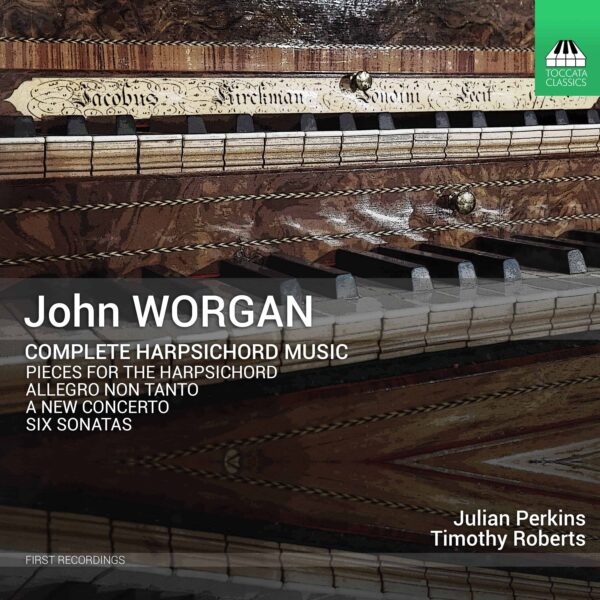
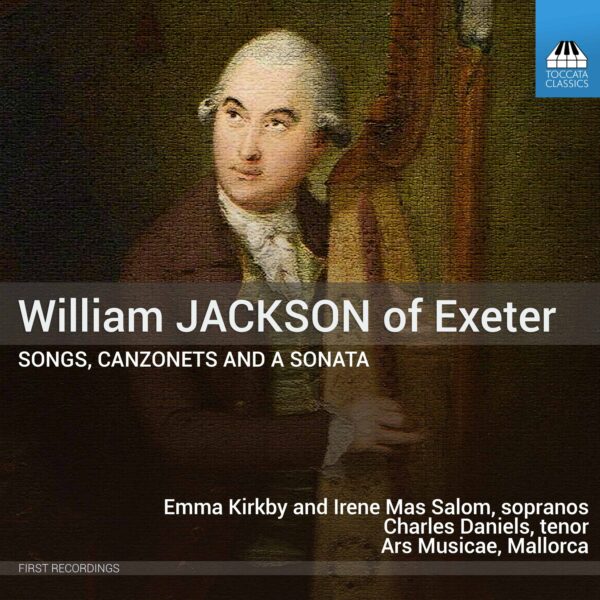
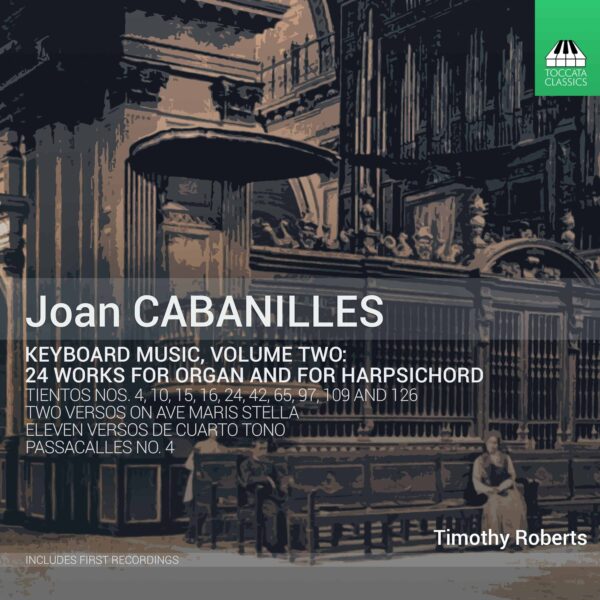
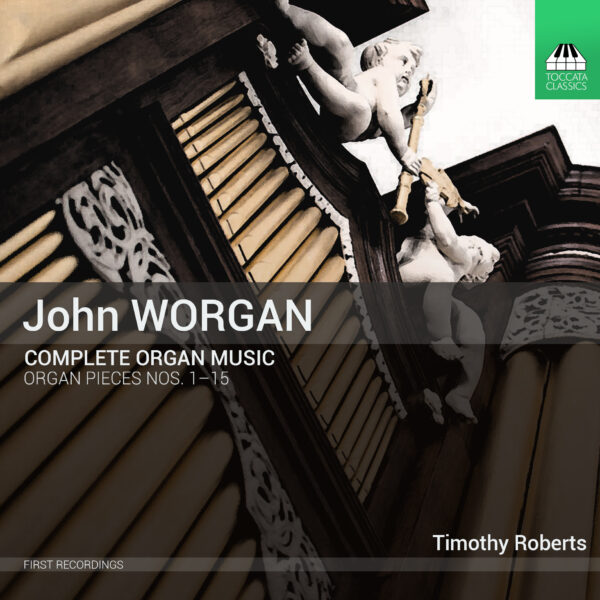
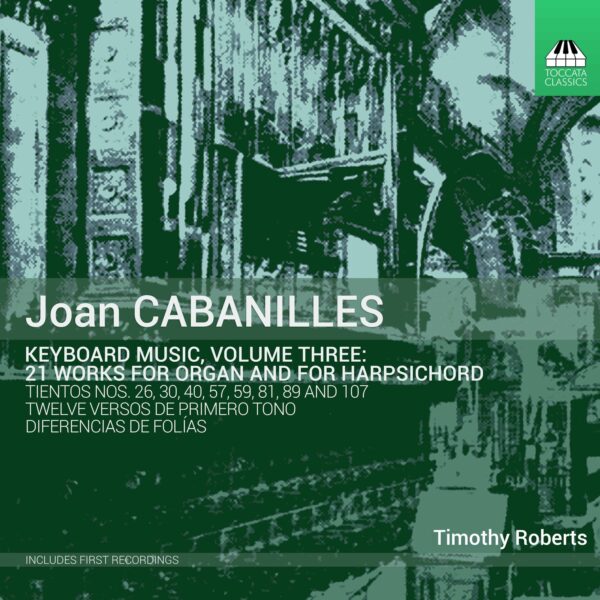
MusicWeb International :
‘he [John Worgan] was well known to Handel, who much admired his playing, and to Charles Burney who termed him ‘very masterly and learned’. […]
Roberts plays on a Klaus Ahrend double-manual instrument from 1973 (after Dulcken) whilst Perkins uses a harpsichord from the workshop of Jacobus Kirckman of 1772. Both sound excellent and have been splendidly recorded in two different churches.
Both instrumentalists contribute to the full and engaging booklet notes.
Worgan may not have tilled new soil, nor are his keyboard works especially grandiose or ambitious. But they have real character and a sense of personality, they cover a wide array of moods and are splendidly brought to life here in all their wit and charm.’
—Jonathan Woolf, MusicWeb International
Planet Hugill :
‘(★★★★★)
[…] What makes Worgn’s music is the crazy element, some of his sonata movements are rather like Scarlatti on acid, and with Worgan’s fondness for hand crossing I had to double check that these were pieces for just one player. Julian Perkins describes Worgan’s music, not without justification, as being ‘littered with unusual figurations, breaches of eighteenth-century compositional orthodoxy and even moments of harmonic kinkiness’. And yet.
There is something appealing about the sheer imagination of these movements. Nothing outstays its welcome, and sometimes the music feels like you are being bearded by a particularly intense and enthusiastic musician constantly saying what about this, and just listen to this. […]
But this disc should hopefully tempt listeners into exploring more.’
—Robert Hugill, Planet Hugill
Early Music Review :
‘This instrument is particularly well suited to Worgan’s music; it is beautifully recorded, and it is a pleasure to have the chance to hear it. […]
Roberts’ highly informative sleeve notes conclude by saying that Worgan’s music ‘needs no deep musicological understanding to be enjoyed’. It represents a public, rather than a profound, expression but it is good for the spirits and certainly well worth a hearing. Both players have done the composer proud in this welcome recording.’
—Noel O’Regan, Early Music Review
Andrew-Benson-Wilson Early Music Reviews :
‘The Sonatas are given imaginative and compelling performances from Julian Perkins.’
—Andrew Benson-Wilson, Andrew-Benson-Wilson Early Music Reviews
musica Dei donum :
‘There can be little doubt that Worgan was an original mind, very much like Richard Jones discussed above. Julian Perkins, in his notes in the booklet, rightly wonders “why has Worgan’s music been largely forgotten”. He was admired by Handel and Burney, and Charles Wesley Jnr was his pupil. History is not always fair. The recording by Roberts and Perkins attests to the quality and originality of Worgan’s keyboard music. The performances by these two artists is as good as one may wish. […] Here we hear a doublr-manual Kirckman harpsichord of 1772, and the tuning in unequal temperament makes sure that the harmonic peculiarities in Worgan’s sonatas come off to the full. It also has several stops which are used to good effect in some movements. […]
Worgan certainly deserves a revaluation, and this disc is a major step in that direction.’
—Johan van Veen, musica Dei donum
American Record Guide :
‘His style is quirky, probably deliberately so. Imagine a blend of Domenico Scarlatti, Handel, Geminiani, JC Bach, and young Mozart. […] Both of these players do well in bringing out the humor and brilliance of the pieces.’
—Bradley Lehman, American Record Guide